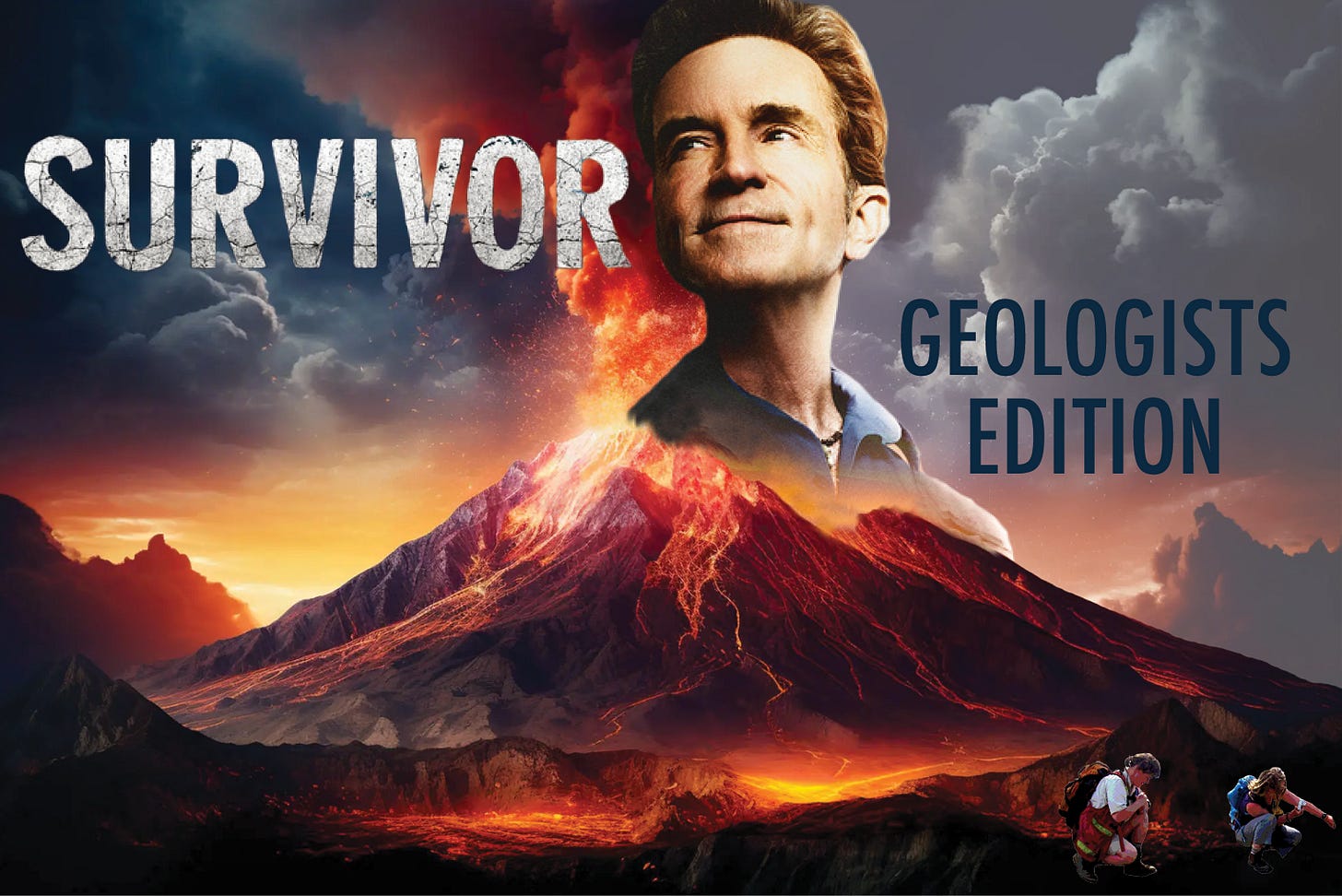Even TV cameras can't excite geologists
Years ago, I read an entertaining article about a doomed attempt to create a ‘Survivor’ style show starring geologists. As someone from a family of geologists (my father, sister, brother, husband, brother-in-law and brother’s partner are all geologists), I found the article both spot-on and amusing. I thought again about it recently, in the context of trying to imagine what a reality show starring anthropologists might look like. After scouring the internet, I was only able to find a scan of the original newspaper article, which was published in 2008 in the Johannesburg Star. Thinking it a shame that the article is not in wider circulation, I tracked down its author, James Clarke, and asked if he would give me permission to republish it here, which he very kindly did. I don’t plan to make a habit of posting other people’s work on this Substack, but I hope you enjoy this piece – you’ll get my own version of what Survivor might look like if it featured anthropologists in the next few weeks.
By James Clarke
Bio: James Clarke is a writer and humorist based in South Africa. Known as ‘South Africa’s Best Humour Columnist’, His ‘Stoep Talk’ column has been a staple in the Johannesburg Star for decades and he is the author of numerous books of humour.
*
I’ve received an interesting email based on an informal note by a mineralogist at Mintek in Randburg commenting on how the media rarely presents geologists to the general population.
If you discount the ‘sound bytes’ on Discovery Channel’s volcano specials, they rarely get a mention, he says.
Well, no wonder…
A big American TV company last year tried to integrate geologists working in hazardous circumstances into a ‘Survivors’ style show.
It hired a production crew and corralled a group of geologists prepared to vote each other off based on how they reacted while performing hazardous tasks such as crawling around active volcanoes, testing landslides, making hazardous flights into remote areas and so on.
The last remaining ‘hard-core geologist’ would win a prize.
The team was plagued with problems from the beginning. They found six male and three female geologists and flew them to a very unstable volcano in the Philippines.
The nine scientists bonded nicely on camera, especially when given alcohol. But the camera crew noticed that even after drinking ‘gallons’ the geologists continued talking in ‘an obscure jargonised language about “breccia”, and “lahars”, none of which made for good reality TV’. The only rise in tension came when the seismologist and the structural geologist got into a yelling match over the best recipe for chilli.
When the geologists climbed the volcano to probe its secrets they went in different directions and camera crew was unable to find more than two working together.
The geologists felt that the volcano could erupt any moment. On hearing this the cameramen disappeared. The result was almost no footage, and the TV editors were unable to make sense of what they had because they had no idea what the geologists were talking about.
Few of the scientists seemed to understand the concept of voting off another member. Finally, they were told to just get rid of someone on any sort of criteria so they decided to dump whoever had the worst aim with a rock hammer.
The second event, landing in a ski plane in Alaska’s frozen waste, failed because none of the geologists was nervous and thus there was no sense of drama – except among the camera crew. The crew refused to go on site. Instead it gave the scientists two cameras and asked them to film themselves.
When the editors went through the footage they found it was all about ‘glacial erratics’. Only 10 percent of the footage showed humans – mainly a petrologist standing passively to show scale.
In Hawaii’s volcanic zone most of the cameramen quit, defeated by the chilli diet and stressed by the danger. And only five geologists remained. The rest had become so fascinated by rock formations that they stayed behind.
Paying for an almost-constant supply of beer and the transportation of the geologists' heavy piles of rock samples almost exhausted the budget. The project has now been canned.
So geologists will remain an enigma.
In my experience palaeontologists (fossil hunters), despite the same pre-occupation with rocks, make for far better material. They would make a splendid ‘Survival’ series for they are very quarrelsome; they have a great sense of humour and they behave dramatically when, after days of lying in the dust scraping away at the ground, they leap around in ecstasy.
Glenn C Conroy, a professor of palaeo-anthropology (palaeo-anthropologists look mainly for pre-human bones) at Washington University in St Louis, Missouri, told me about a cannibal restaurant that charged four times as much for cooked palaeo-anthropologists as it did for cooked missionaries.
Asked why, the chef said, ‘Have you ever tried to clean a palaeo-anthropologist?’





